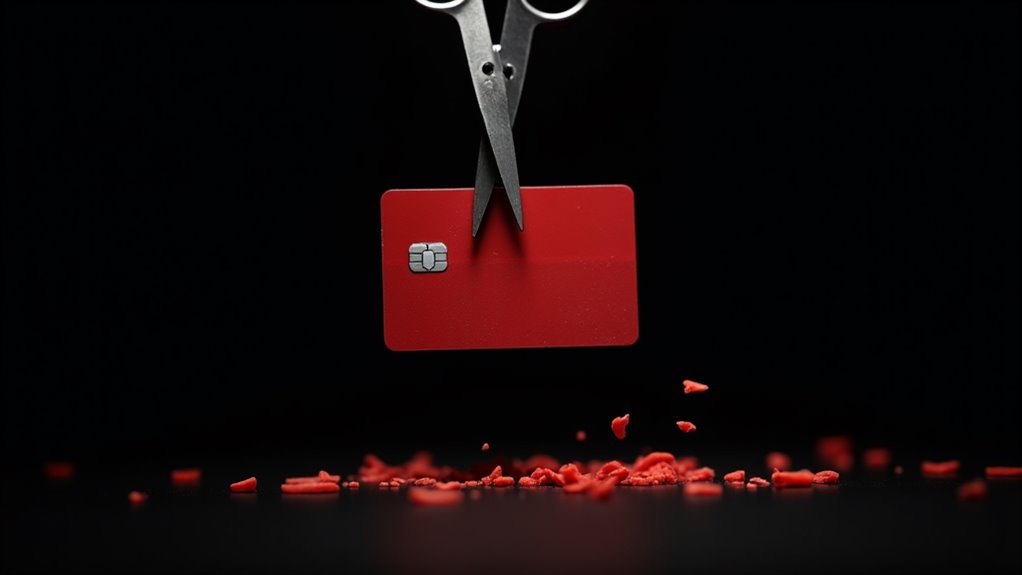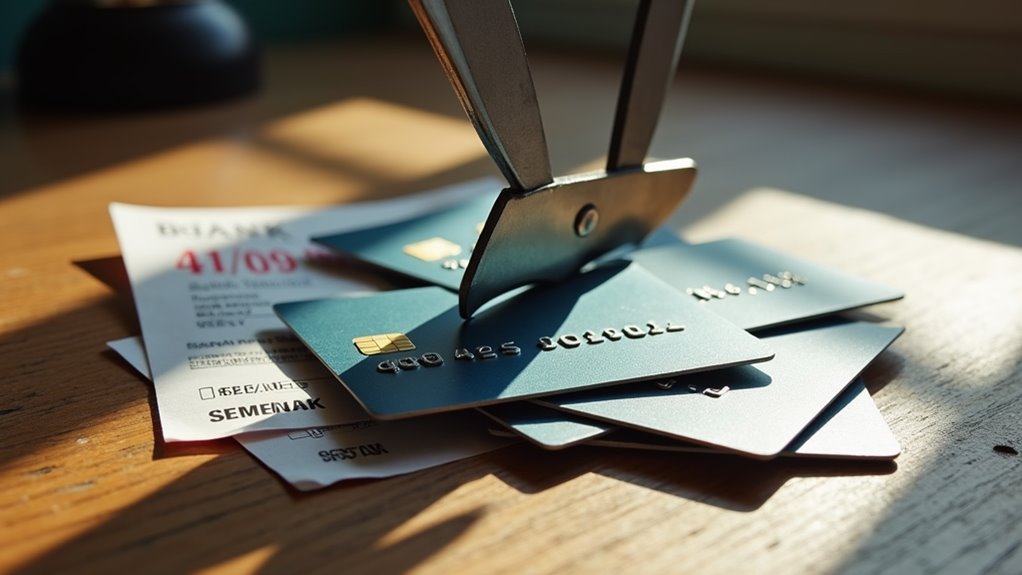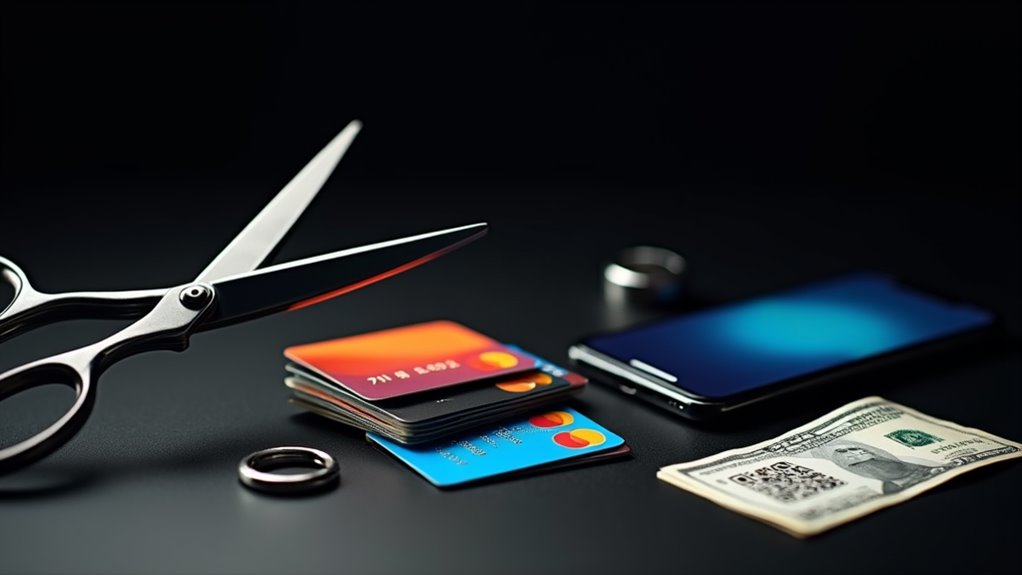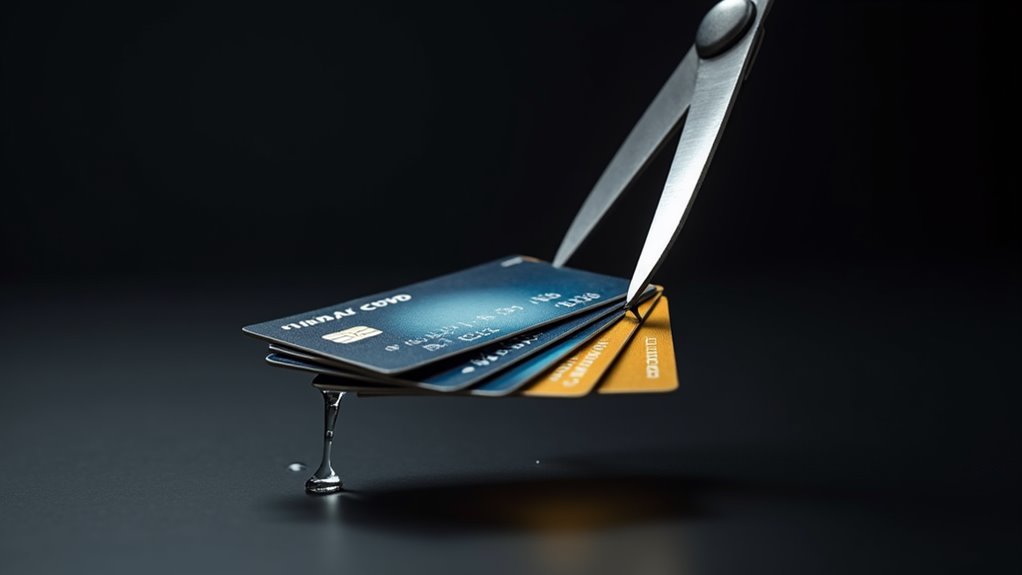Breaking free from credit cards starts with understanding why you're drawn to them – from the dampened pain of spending to those enticing reward systems that trigger pleasure responses. You'll need to recognize warning signs like charging basic necessities or making only minimum payments. To successfully cut ties, switch to cash transactions which can reduce spending by up to 18%, and explore alternative payment methods like Klarna or Affirm for larger purchases. Building an emergency fund through automatic transfers while tracking expenses will help establish healthier financial habits. The path to financial freedom begins with these first crucial steps.
Key Takeaways
- Switch to cash payments to increase spending awareness and reduce impulse purchases, as physical money creates immediate loss recognition.
- Create an emergency fund through automatic savings transfers before canceling credit cards to ensure financial security.
- Consider alternative payment methods like Klarna or Affirm for large purchases while transitioning away from credit cards.
- Monitor credit utilization and maintain open credit accounts to protect credit scores during the transition period.
- Implement a 24-hour waiting period for non-essential purchases to develop mindful spending habits without credit cards.
The Psychology Behind Credit Cards

While cash transactions create an immediate sense of loss, credit cards numb the psychological pain of spending money. When you swipe a card, your brain doesn't register the same financial impact as handing over physical bills. This disconnect makes it easier to overspend and harder to track your expenses.
Credit cards also trigger reward centers in your brain through points, cashback, and perks. You're more likely to make impulse purchases when you feel you're getting something extra for your spending.
The delayed payment structure further distances you from the reality of your purchases. You won't feel the impact until weeks later when the bill arrives, often leading to shock and regret.
Understanding these psychological triggers can help you make more conscious spending decisions and avoid falling into debt traps.
Warning Signs of Credit Dependency
When you're charging everyday necessities like groceries and gas to your credit card because you lack cash, you've likely entered dangerous territory with credit dependency.
You'll notice other red flags when you're making only minimum payments, juggling multiple cards, or treating credit limits as part of your regular income.
If you're frequently using one credit card to pay off another or lying to family about your spending habits, these behaviors signal it's time to address your credit reliance.
Red Flags While Spending
Despite the convenience of credit cards, several warning signs can indicate you're becoming overly dependent on borrowed money.
You'll notice you're using credit cards for basic necessities like groceries and gas, while struggling to pay more than the minimum balance each month. If you're juggling multiple cards or using cash advances to pay other bills, you're heading down a dangerous path.
Watch out for impulse purchases you can't afford and the habit of ignoring your monthly statements.
When you're counting on your next paycheck to cover last month's charges or applying for new credit cards because existing ones are maxed out, it's time to reassess your spending habits.
These behaviors signal a shift from responsible credit use to problematic debt accumulation.
Living Beyond Your Means
Living beyond your means often starts with subtle signs that can snowball into major financial troubles.
You'll notice you're making only minimum payments on credit cards while continuing to charge new purchases. Your savings account balance keeps dropping as you dip into it for regular expenses.
Warning signs include regularly overdrawing your checking account, taking cash advances from credit cards, or borrowing money from friends and family.
If you're hiding purchases from loved ones or lying about your spending, you're likely in trouble.
Other red flags are using one credit card to pay off another or finding yourself unable to contribute to retirement or emergency funds.
Don't ignore these indicators – they're clear signals that you need to reassess your spending habits and create a realistic budget immediately.
Life Without Credit Cards

You'll discover remarkable freedom in cash-only living, where every dollar spent becomes a conscious choice rather than an abstract future payment.
Breaking free from credit cards helps you establish healthier spending habits by connecting you directly to your money's real value.
When you need alternatives for specific purchases, you can rely on debit cards, mobile payment apps, or secure online banking services that keep you firmly grounded in your actual bank balance.
Cash-Only Living Benefits
While credit cards offer convenience, switching to a cash-only lifestyle can transform your financial health and spending habits.
When you're limited to physical cash, you'll naturally become more mindful of your purchases and avoid impulse buying.
Using cash helps you stick to a budget since you can't spend more than what's in your wallet.
You'll eliminate interest charges, late fees, and the stress of monthly credit card bills.
Research shows you're likely to spend 12-18% less when using cash instead of credit cards.
You'll also develop better financial discipline as you learn to save for larger purchases rather than relying on credit.
Without the burden of credit card debt, you can focus on building an emergency fund and investing in your future.
Breaking Spending Habits
Breaking free from credit cards requires a strategic approach to rewiring your spending psychology.
You'll need to identify your spending triggers and develop healthier financial habits. Start by tracking every purchase you make for a month, noting both the amount and your emotional state when buying.
Replace impulsive shopping with planned purchases by implementing a 24-hour rule for non-essential items. You're more likely to make rational decisions when you give yourself time to think.
Create shopping lists before entering stores and stick to them firmly. If you're prone to online shopping, unsubscribe from retailer emails and delete shopping apps from your phone.
Set specific savings goals and visualize them daily. When you're tempted to spend, remind yourself of these objectives and how each dollar saved brings you closer to achieving them.
#
Alternative Payment Methods
Living without credit cards might seem daunting, but several practical alternatives can keep your finances running smoothly.
You can use debit cards linked to your checking account for everyday purchases and online shopping. Many retailers also accept digital payment apps like PayPal, Apple Pay, or Venmo.
For larger purchases, consider setting up a dedicated savings account and using cash. You'll find that carrying cash often helps you stick to your budget since you can physically see your money decreasing.
When traveling, prepaid travel cards offer a secure alternative to credit cards, while money orders work well for sending payments through the mail.
Remember that many bills can be paid directly from your bank account through automatic withdrawals or electronic transfers.
Building Better Financial Habits
To climb out of debt and maintain financial stability, you'll need to develop stronger money management habits.
Start by tracking every expense and creating a realistic monthly budget. You'll want to distinguish between essential needs and discretionary spending, then allocate your money accordingly.
Make it a practice to save a portion of your income before spending on non-essentials. Set up automatic transfers to a separate savings account, and build an emergency fund to cover unexpected expenses.
Review your recurring bills and subscriptions regularly, canceling those you don't use or need. When shopping, implement a 24-hour waiting period for non-essential purchases to avoid impulse buying.
Remember to check your account balances daily and review your credit report quarterly to stay on top of your financial health.
## Alternative Payment Methods

When struggling with debt, exploring alternative payment methods can provide flexible solutions for managing your finances.
Consider using cash for daily expenses to prevent overspending and maintain better control over your budget. Debit cards linked to your checking account offer convenience while limiting spending to available funds.
Digital payment apps like Venmo, PayPal, or Cash App let you transfer money instantly and track expenses easily. Many of these services also offer budgeting features and spending analytics.
For larger purchases, explore buy-now-pay-later options that offer zero-interest installment plans, but read the terms carefully. Services like Klarna and Affirm can help you spread out payments without accruing credit card debt, though you'll need to stay disciplined with repayment schedules.
Rebuilding Credit After Cancellation
After credit card cancellation, rebuilding your credit score requires patience and strategic financial planning.
You'll need to focus on establishing positive credit habits through alternative means. Start by getting a secured credit card, which requires a cash deposit as collateral.
Make small purchases and pay them off completely each month. You can also become an authorized user on a trusted family member's credit card to benefit from their good payment history.
Consider credit-builder loans from credit unions or online lenders. These loans hold your money in a savings account while you make payments, helping you build credit.
Make sure all your other bills are paid on time, as payment history affects 35% of your credit score. Keep your credit utilization low and monitor your credit report regularly for improvements.
Frequently Asked Questions
Can I Keep One Credit Card for Emergencies While Canceling Others?
Yes, you can keep one credit card for emergencies while canceling others. Choose a card with the lowest interest rate and best terms for your emergency card.
Before closing other accounts, make sure you've paid off their balances and consider how closures might affect your credit score.
Remember to store your emergency card somewhere safe, not in your wallet, to avoid temptation for non-emergency purchases.
Will Closing Credit Cards Affect My Ability to Rent an Apartment?
Closing credit cards can impact your ability to rent an apartment since many landlords check your credit score during the application process.
When you close cards, you'll reduce your available credit and potentially increase your credit utilization ratio, which can lower your score.
If you're planning to rent soon, consider keeping your cards open until after you've secured your apartment lease.
How Do I Handle Recurring Subscriptions When Canceling Credit Cards?
Like untangling a complex web, managing subscriptions before canceling cards requires careful planning.
You'll need to list all your recurring charges and contact each merchant to update your payment method.
Don't forget streaming services, gym memberships, and auto-pay bills.
It's smart to switch these to your new card first, or you might face service interruptions and late fees.
Consider using a subscription tracking app to catch everything.
Should I Tell My Credit Card Company Why I'm Closing Accounts?
You don't have to explain why you're closing your credit card accounts, but sharing your reasons can be beneficial.
If you're leaving due to high fees or interest rates, the company might offer better terms to keep your business.
Your feedback also helps card issuers improve their services.
Just remain professional and honest when discussing your decision, whether you choose to share details or not.
Can Employers View My Credit Card Cancellation History During Background Checks?
While 72% of employers conduct background checks, they can't see your specific credit card cancellation history.
Your credit report only shows whether accounts are open or closed, not your reasons for closing them.
Employers who run credit checks typically focus on outstanding debts, bankruptcies, and overall payment history – not your choices to cancel credit cards.
These checks require your written permission first.
Conclusion
You're standing at a crossroads, with your financial future hanging in the balance. Breaking up with credit cards isn't just about cutting plastic – it's about rewiring spending habits and embracing financial freedom. Whether you choose to maintain a single emergency card or go completely card-free, remember that your journey to financial wellness is uniquely yours. Take those first bold steps today toward a debt-free tomorrow.

Leave a Reply